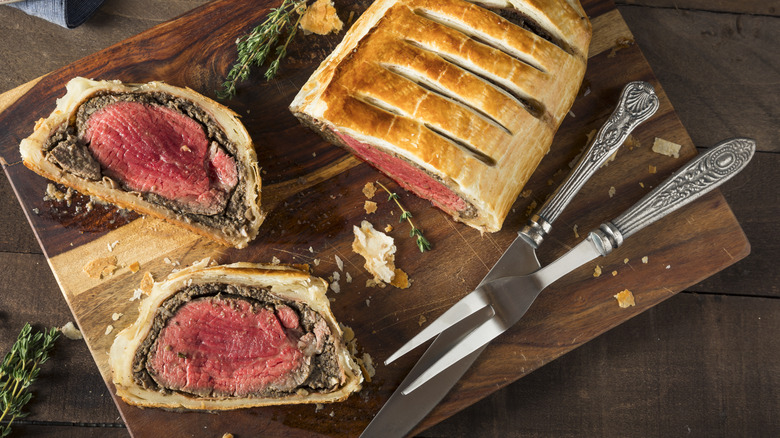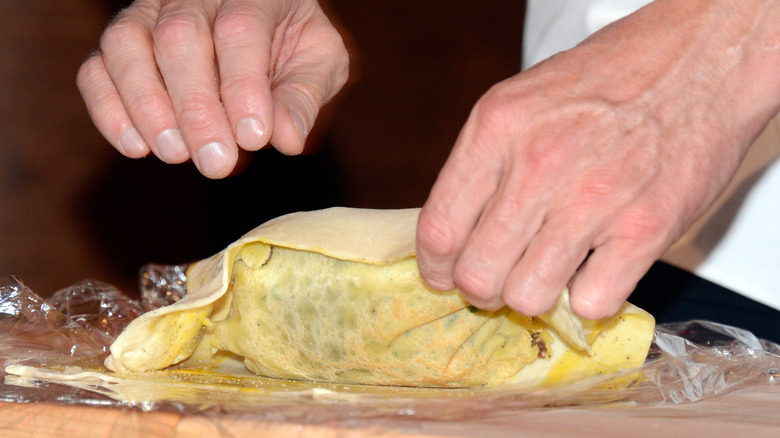The Noble History Behind The UK's Beloved Beef Wellington
Beef Wellington reigns as a supremely British dish, sitting royally on menus like a calling card for genteel society. But despite that posh culinary connotation, the beloved beef-and-pastry wonder also holds a hearty presence on home dining tables and pub-grub menus, including countless pubs and hotel restaurants in London alone, notes The Handbook guide to England's capital city. The origins of beef Wellington hold some secrets, to be sure, but most culinary historians nod strongly to noble connections.
With iconic British chefs such as Gordan Ramsay calling beef Wellington the ultimate indulgence worthy of inclusion on a "last supper menu," the dish deserves a definition. Fortunately, there are many. Gordan Ramsay Restaurants calls it flaky puff pastry with tender sirloin steak and a tasty duxelles, which is an ingredient the Martha Stewart website describes as a mixture of chopped herbs, shallots, and chopped mushrooms. Even duxelle harbors a noble birthright, named for France's Marquis d'Uxelles of the 1600s, according to WordSense.
Despite many historic food references to meat and pastry combinations, including the Cornish Pasty from the 14th century, the evidence tying beef Wellington to British nobility remains a core component of culinary history. Here's how the story unfolds.
The Duke and Napoleon Bonaparte
If Napoleon Bonaparte hadn't suffered defeat at the Battle of Waterloo in 1815, perhaps Britain's favorite savory pastry wouldn't exist — or would at least bear a different name. As the story goes, Arthur Wellesley, the 1st Duke of Wellington, led the famous battle against Napoleon and went on to become Commander-in-Chief of the English forces in France, then a member of Parliament, and finally, Prime Minister of Great Britain, per the official website for the U.K. Government. The illustrious man received many accolades, but perhaps the most enduring still gets top billing on menus more than 200 years later.
Culinary lore has yet to firmly establish whether beef Wellington was created to honor the Duke or simply renamed because of his ties to it. Several theories exist, notes Gordan Ramsay Restaurants, one of which credits the Duke's chef for having free rein over the kitchen due to Wellesley's dining indifferences. Another story implies the dish got its name from the now-iconic Wellington boot, also known as "the wellie," conceived by the Duke for comfort and created by his cobbler, explains English Heritage.
Finally, a third conceivable origin story involves the pre-existing French dish known as filet de boeuf en croute, which potentially was renamed beef Wellington after the Duke's victory at the Battle of Waterloo. Regardless of which version bears up under historical scrutiny, they all center on the infamous 1st Duke of Wellington, a nobleman, military leader, and political influencer in Great Britain.
The pond and beyond
As the saying goes, it's a culturally short distance "across the pond" from Britain to America, and dishes like beef Wellington feed that perception. Though it is a British contribution, Gordon Ramsay Restaurants reveals strong evidence that America raised beef Wellington to a place of prominence. A 1903 advertisement for it in the Los Angeles Times supplies one of the earliest documented references to the upper-crust dish. A New York City dining guide elevated it further in 1939. By 1965, the New York Times was touting its own recipe with the additions of truffles and cognac. Beef Wellington's notoriety soared after appearing in a White House cookbook and Julia Child's television show.
Naming food after famous people is a tradition that dates way back. Culture Trip notes noble blood running through quite a few modern-day favorite foods, including the sandwich, named for John Montagu, Britain's Earl of Sandwich. He unwittingly created a future food of "commoners" (per HuffPost). The Margherita pizza reportedly got its moniker from Queen Margherita of Savoy after she visited Naples, according to Fodors, while The Odessa Journal explains that Beef Stroganov is linked to a Russian count in the 1800s. And the Caesar salad? It's tempting to say it hails back centuries to the Roman reign of Julius Caesar, but the truth is less noble and more interesting. As the story goes, it followed an Italian immigrant to Mexico, where it debuted at the Hotel Caesar in Tijuana (via BBC Travel).


